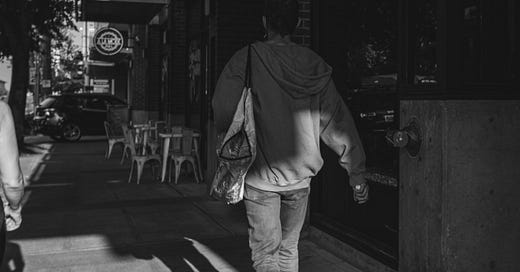Envy is like heartburn. Fairly benign but it can startle you and grip your existence like a cold plunge. On the other hand, it can remind you to be more attuned to the mysteries of your body and a sense that you’re not in complete control. Maybe that means looking into not what the heartburn feels like but why it originated and what it’s doing. And like heartburn, envy comes from a lot of things that seem to bring us joy: the vacations, the families, the material things, or the successes we’ve gained.
Envy, a nasty little thing: episodic, fleeting, but uncared for can turn quickly into embers that can burn for a lot longer than you anticipated.
In all of these scenarios, there is propulsion built into envy that, for a lot of artists, could be defined as “drive” or “ambition.” I’ve been thinking about envy a good amount and it’s hard not to. Envy is all around us in the gaps between what we have and don’t have, what we yearn for and think we need, and what we are versus what we’d like to become. There’s envy about money, envy about success, envy about mortgage rates, envy about government, and envy in just about every corner of our little existence. For most people, envy has a fairly straightforward negative connotation and to entertain it is a high wire act. It’s usually something you’re not bragging about during a night out with friends.
“Ya’ll I’m so pumped with envy, right now!”
But envy seems to have two sides to it. According to a study from a decade ago, which looked at admiration and envy, found that envy, for the most part, fell into two camps around the world: malicious envy (that’s the yucky kind where you are a psychopath) and benign envy (which is like “Oh my god, Becky, that dress is so cute on you” envy).
“Malicious envy felt much more frustrating, the experience led to a motivation to hurt the other, and one hoped that the other would fail in something,” van de Ven wrote. “For benign envy, the other was liked more, the situation was more inspiring, and one tried harder to attain more for oneself.”
Benign envy can sound a lot like admiration. The difference is that, while admiration feels good, envy is painful. By way of illustration, van de Ven cites the philosopher Søren Kierkegaard, who wrote that, while “admiration is happy self-surrender,” “envy is unhappy self-assertion.”
Currently, I’m benignly envious of a lot when it comes to my career, the value I provide to society, and the crafts I want to develop. For example, I’m benignly envious of so many exciting photographers who are making a living and elevating one of the most beautiful art forms in the world. So many of them are pushing the boundaries with the medium, and wow are they completely fearless of the costs, both monetary and creative.
Since we’re taking notes, I’m also benignly envious of people who have a super healthy relationship with their jobs. I’m benignly envious of anyone that can maintain 200 watts for 30 minutes on a Peloton. And I’m benignly envious of people that can actually use fancy journals for more than a very expensive to-do list holder.
The weird thing I’m grappling with is that I’m not envious of what artists, photographers specifically, are doing but when they are doing it. A lot of fantastic artists I see today are closing in on 30, possibly still developing, but making moves I made back when I was that age. Younger ADLC might have kicked and snarled, but fairly accomplished dad, husband, and homeowner ADLC feels envy today the way I feel the energy in my knees: it’s always fleeting. In some ways, though, it’s because I have a sense of a dreaded reality that I’m kind of past my prime. Like the energy in my knees, most of the team it’s barely even there.
In fact, when I start feeling the “damns”, as I’ll call it (you know when you see something YOU could have done and are like “dammmmn”), I usually have both a smile and a lot of admiration. I feel an urge to learn, and study, and a lot of times, I get really inspired to create. Older age envy seems to be something less corrosive and a bit more additive to growth. Maybe envy at this age is really like a vitamin supplement: maybe it’s doing good, maybe it’s all placebo. Envy is sometimes just that voice that says “Get up, you baby, that person worked hard and you can, too.” It feeds. But, as the study above learned, its lineage is tied closer to pain than joy. But isn’t everything good worth a bit of suffering?
The Takedowns
One of the hardest things about diving headfirst into a passion is getting kicked in the teeth. At least that is sometimes what it feels like when acknowledgement isn’t there. When you’re younger, it can transcend into real things like losing momentum, accumulating doubt, and accepting defeat. The reality is that I’ve dealt with a bit of the bad kind of envy, especially as a know-nothing writer in my earlier days because I hadn’t matured to understand that suffering is part of the experience. When we suffer, we’re already on our way to something beautiful.
I still remember how visceral it felt during a few months in Mexico. It was 2008 and I was dabbling with starting a podcast. It was a fairly simple pilot. I picked a song, talked about it for a few moments, stacking a personal vignette around it, and then I played the track. A person now known as a relatively successful journalist commented on my podcast episode that it was a waste of time. I thought, “What a prick!” And what would have likely been the end of it turned into a few years of that malicious kind of envy, mainly because we weren’t far from the epicenter of late 2000s journalism. I even brought along a few people to dismiss this person for no real reason. Our lives went on, and I ended up quitting my case of journalism slave labor (blogging in the 2000s), and that episode kept nagging me. Before then, confidence careened through my veins like gin and tonics on a summer night. That person’s journalist cred skyrocketed: he’s a very successful journalist at a very major publication now. Looking back, I had nowhere near the talent, work ethic, or confidence of this person. In fact, I realized a few years later I admired this person more than envied. His comment sucked, but it catapulted a drive that I likely needed. Less than a year later I was traveling the United States with StoryCorps and had one of my facilitated interviews air on NPR’s Morning Edition.

All I wanna do is freudenfreude
I love good news. You love good news. We all love good news. I sometimes measure my mood by how excited I am about the things happening in my bubble: a friend buying a house, my son learning a new skill, another friend’s project gaining steam, or my wife getting enough sleep.
But it’s hard to wade through the bad shit. Today’s world is overrun by distress and I find that envy always blossomed in times of “what ifs.” Our entire lives, every moment of our existence, is a “what if”, both good and bad. It’s in my geriatric millenial age that I’ve come to sort of appreciate all of those good “what ifs,” but I’m cautiously aware of the bad ones the way I know rats are probably roaming my backyard at night. The terrible truth about bad “what ifs” is that they seem to replenish us when they happen to others. Shadenfreude eases so much. When others falter, we feel better. But in a 2012 study, researchers found that there’s tremendous backfiring when someone relies on others misfortunes. It seems obvious. Laugh at someone who falls on a sidewalk and what are we lacking? Empathy. So what if there was an action to nurture that? Welcome, freudenfreude.
“When we feel happy for others, their joy becomes our joy,” said psychologist Marisa Franco, author of “Platonic: How the Science of Attachment Can Help You Make — and Keep — Friends.” To that end, freudenfreude encourages us to look at success as a community achievement.
“No one gets to the top alone, and when we elevate others, we’re often carried up with them,” Dr. Anhalt said.
And for the takedowns, I don’t really feel them as much because I have both proof around me that I’ve done well. Today, my only takedowns come from my kids when they call me “doo doo face” or tell me I’m a “70-year-old, man!” But if you do feel envy, remember to think about whether it’s malicious or benign. Like anything in life, a little moderation goes a long way.
Newsletter research took me to this Agnolo Bronzino sketch from 1545 focused on jealousy. It’s subtely intense.
It’s no big secret (maybe a little one) that I’m trying to make a career pivot to full-time photographer, creative, artist. Recently, I started seeing a very considerable drop in my social media engagement. After a bit of research, I guess something called “shadow banning” is actually real. No idea if that’s affected my engagement or if my work is simply a dog turd on a Los Angeles highway of information.
Another bit of research led to this 2017 piece from the BBC about America’s downfall, and I feel like I could read the glee in the writer’s overview.









I love the vulnerability, homie and I like the distinction between malicious and benign envy. I was talking to a friend recently and told him straight up that, between all our trash-talking, he’s never said a nice thing about me. He responded that he says nice things about me all the time … to other people, just not to me. And it made me realize that is probably true for all of us. So let me say: I love the aesthetic of your newsletter and it inspires me to up the editorial design of mine. And, if I haven’t already said it, I’m a big fan of your photography. I especially like what you’ve been doing with color lately. The contrast between the brown grass at gasworks and the navy blue lake is so good (and the contrast of the texture too with the wake of what I assume was a boat).
I would regularly envy/admire folks older than me when I was in my 20s and early 30s. I always felt, like, well maybe I’ll be like them at that age. One of the weird things about being in my 40s is that now I regularly envy/admire the work of people younger than me. And then it’s hard to feel like I’m not already past my prime. Maybe that’s true for some things, but not for all. I try to remind myself that I can be envious of a future version of me too … one that keeps growing and improving and becoming more self-aware about my creative muse.